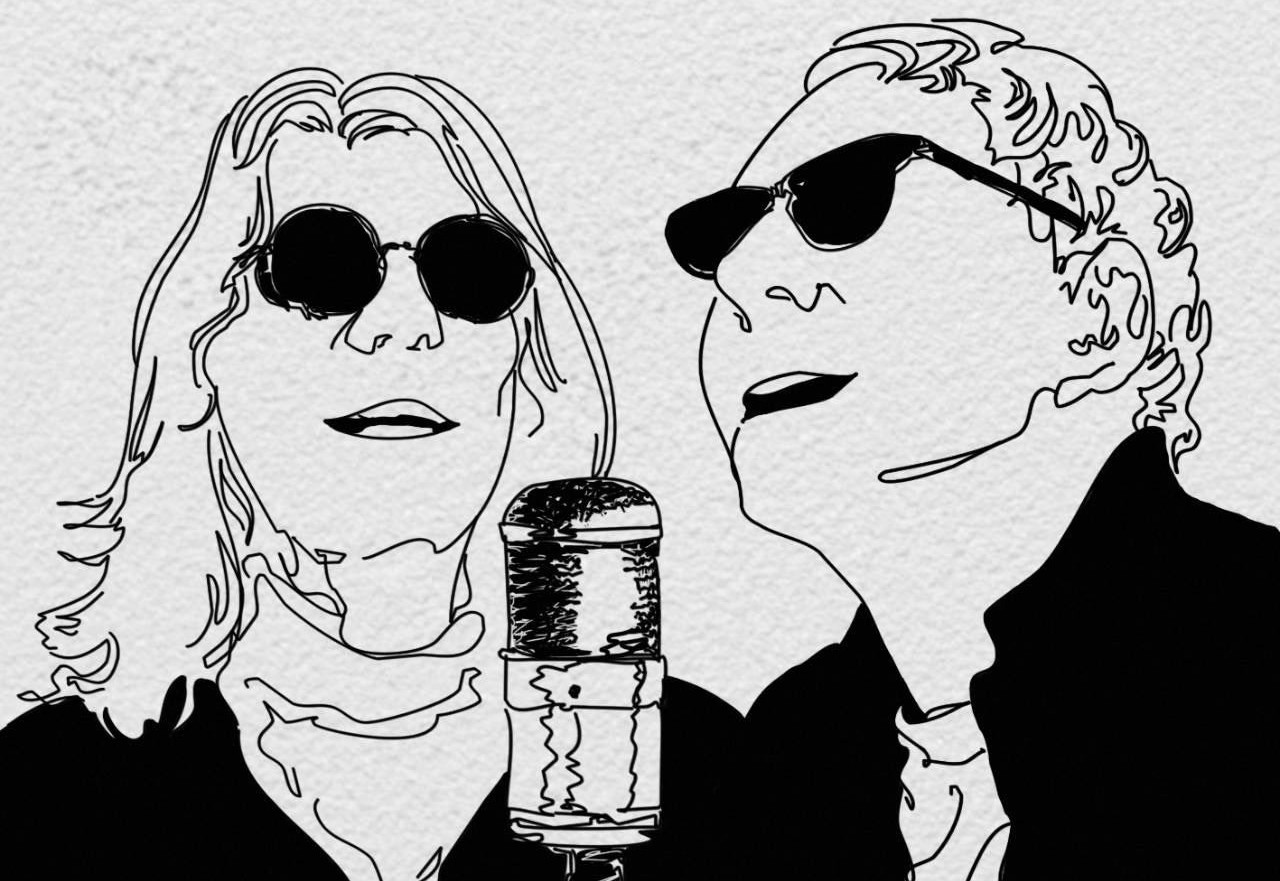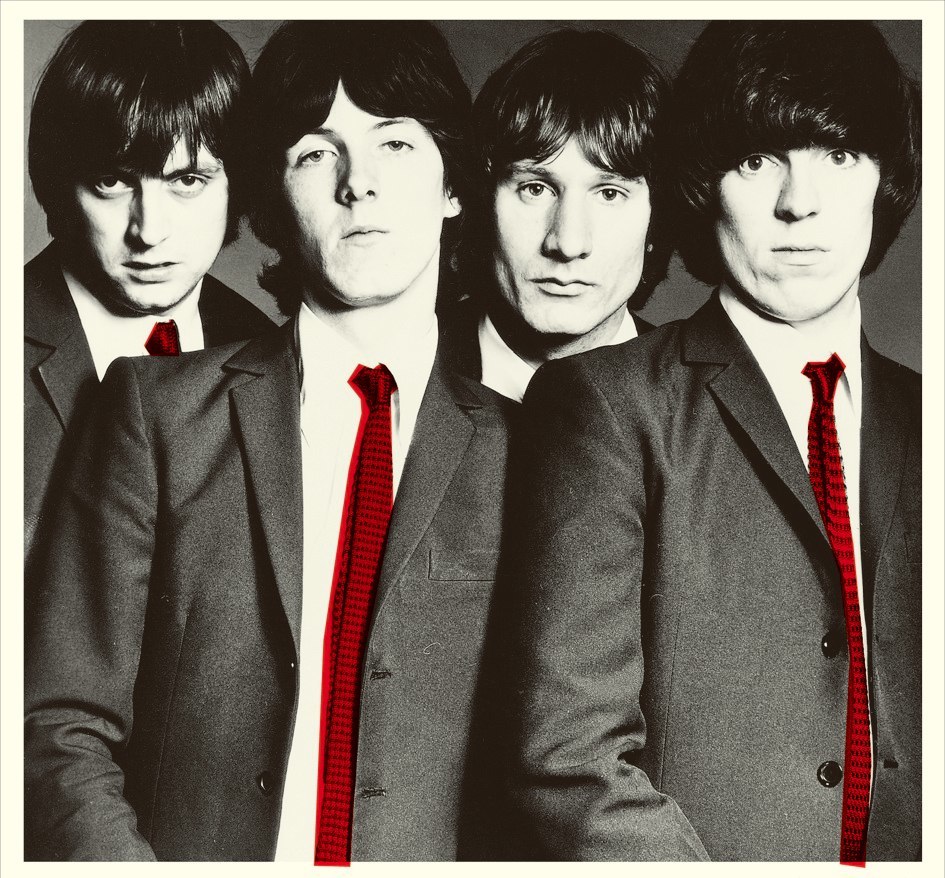
By Jason Barnard
They called it Thamesbeat, half in jest, but it stuck. The Pleasers were sharp, melodic and half a step out of time, in the best way. Over four decades on, founding songwriters Bo Benham and Steve McNerney haven’t just reunited, they’ve rebooted with One Second In Time, a single that shimmers with the DNA of Abbey Road, but breathes with the pulse of now. What follows is proof that pop instincts never fade, they just grow bolder.
After all these years, you walked back into Abbey Road and came out with a new single. That is not just full circle, it’s a full orbit. What did it feel like, sonically and emotionally, to master your new music in the same space where The Pleasers first laid down tape in 1976?
Bo: It was like a deja-vu moment for me, mixed with a kind of coming home feeling. I appreciated it more now than I did back then. For the majority of musicians who ever venture into Abbey Road studios, Its like a shrine for obvious reasons. Sonically, of course it’s great, cos most of the mastering engineers have been working there for donkeys years and you feel confident cos they know their desks and what they are doing. Emotionally, it just grabs you. From the toilets to the back stairs the cafeteria the garden and into those sacred studios, it oozes history, creativity and innovation through the walls.
Steve: Our first time there was actually November 1976 the record was released early 77. I remember rolling up in my little red Daf van not a Corvette. I’m sorry to say and although I was aware of the magic created in Studio 2, being 19 and caught in the whirlwind, I took it all in my stride and was focused on playing and singing the best I could. But I do remember sitting on the toilet and thinking, they sat here! This time was different. I was more aware of aura and the amazing music that came out of the place. So yeah, I felt much more emotion this time around.
One Second In Time has that unmistakable sparkle of classic Merseybeat with a dash of Beatles psychedelia – chiming guitars, close harmonies, handclaps underscored with bittersweet optimism. Was that sound a conscious homage, or the natural result of your musical DNA?
Bo: I’ll take that as a real compliment, thank you! But no, it wasn’t a conscious thing at all. It’s just what naturally comes out when Steve and I work together on the track. (Anyway, I’d say it sounds more Thamesbeat than Merseybeat)! We never sit down and say, “Let’s make this sound Merseybeat” or “Let’s throw in a bit of Beatles psychedelia.” It just kind of happens that way!
I suppose if it sounds that way, then yeah, it’s probably buried somewhere in our musical DNA. We grew up with that stuff, it’s in our blood, so I guess it’s bound to come through whether we mean it to or not. I don’t think the rest of the album sticks to that sound quite as much, but honestly, I’m not too fussed about labels. If people hear something they like and it makes them feel good, that’s all that matters.
Steve: Definitely my DNA. All those elements come naturally and always have done.
The Pleasers helped pioneer Thamesbeat, a term that is somehow both precise and slippery. If you had to define it for someone raised on Spotify playlists, how would you explain the spirit of Thamesbeat in 2025?
Bo: I wouldn’t say we necessarily pioneered Thamesbeat. The term actually came from Steve, kind of as a joke during a BBC Radio 1 interview. They called our music Merseybeat, and he just said, “Nah, it’s more like Thamesbeat,” since we were all from in and around the Thames area. But the name stuck, so we thought, sod it, why not? It’s a nice enough label. The press at the time also called our music Powerpop, though to this day I’m not entirely sure what that’s supposed to mean. Still, it’s better than being called Powerflops! But to actually answer your question, I’d say Thamesbeat is a genre that lets you swim upstream against the tide, back to where it all starts. And when you get there, there’s a good chance you’ll find happiness, contentment, peace, and love. Or at the very least, a good tune and a decent cup of tea.
Steve: I don’t think there is one for me in 2025, and I don’t think there was one back then either. It was just a remark I made to a journalist, the spirit was just the music we were making at the time.
You first started writing songs together during lunch breaks. What has changed about your songwriting chemistry over the years, and what has stayed exactly the same?
Bo: Well now we are slightly older than we were when we were younger! So the lunch breaks are much longer than they used to be. Now it’s a case of when can we get together, due to us both having such busy schedules, like growing vegetables, feeding the cats and the dogs, and going to the shops for supplies.
But to get back to your question, I think we don’t hit each other with sticks and stones as much as we used to when one of us has a bad idea for a song. We haven’t actually written together in quite a long time, though we’ve always managed to stay in touch over the years.
It’s funny, as we get older, none of us really change that much. We mellow, sure, but at the same time we somehow become less tolerant! Writing with someone else is never the easiest thing, but we’ve come out of the studio in one piece and with a great little album. It’s unpretentious, honest, and has that fresh spark we’ve always tried to hold onto.
Steve: I am always right that hasn’t changed. We haven’t written or worked together in such along time, now we respect each other, I don’t think we did back then so it makes the writing more positive and less competitive.
Your debut album was produced by Tommy Boyce of Monkees fame. Now you are self producing. What did you learn back then that still guides your hand today?
Bo: To be honest, we were never completely happy with the way Tommy Boyce’s production turned out. Same goes for what Ron Richards and Geoff Haslam did with some of our early stuff. It always felt like something got a bit lost in translation.
So this time around, we thought, no record company, no outside producer, no middlemen. Just us. And the truth is, between Steve and me, we’ve racked up enough experience over the years to open a DIY university in self-production.
It’s a bit like being an experienced bricklayer, you know how to build the wall, so why hire someone else to mix the cement? We’re not claiming to be top-tier engineers or anything, but we know what we want, and we’ve learned how to get there. Between the two of us, we muddled through and came out with something we’re proud of. Our sound, our way.
Steve: I think just because someone is older, more successful and experienced than you don’t mean they are right.
Of all the tracks you’ve recorded as The Pleasers, which song holds the most meaning for you personally, and has your favourite changed over the years as time and perspective have shifted?
Bo: For me, it has to be the B-side of ‘The Kids Are Alright’ single, a song called ‘Stay With Me.’ That one’s always held a special place in my heart because it was inspired by a real moment that happened while we were staying in a little seaside town called Mundesley. The band was rehearsing there for a tour, and I had a chance encounter with a girl who was studying at a local private school. It was all very innocent, but it left a mark on me, one that took a while to shake off.
Funnily enough, I saw her again a few years later, completely by chance, in a pub in Shepherd’s Bush. I got the chance to tell her the song was written about her, which was a nice little twist of fate. When we went to record it with Tommy Boyce at Pye Studios near Marble Arch, the track started off as an upbeat, mid-tempo number. But then Steve and Nick slowed it right down and played it beautifully on acoustic guitars. Dave came in with the drums halfway through, and that totally changed the feel, it became something much more emotional.
It’s still one of my favourites, mainly because of the memories tied to it, both personal and musical. It reminds me how a little moment in time can stick with you, and how a song can bring that moment back to life. Oh, and did I mention? It’s cos its a great little love song.
Another song that’s also up there for me is ‘Change My Mind,’ which we recorded at the old Olympic Studios in London. That one stands out because it was our last proper recording session and also because, during every break, we’d end up playing table football with Eric Clapton and his band, who were recording in the next studio. Eventually, RSO Clapton’s record company, pulled him out of there because he was spending too much time with us playing footie!
Steve: I have also always liked ‘Change My Mind.’ Partly the sound and feel and lyric of the song, and also because it was the only track Tommy Boyce left us alone to get on with it ourselves. So even though he cut out the middle 8 to my horror he was right. I always had to have a middle 8. It was really produced by us and Nick’s guitar is lovely and the harmonies, it was our last recording. So that’s mine.
Looking back at your time as The Pleasers, what do you think it was about the band’s sound or spirit that connected so strongly with audiences, even if the mainstream spotlight only flickered on briefly?
Bo: I think it was because we were all good, competent musicians who genuinely played well together and enjoyed what we were doing, on stage and off. I can honestly say there were hardly any bad gigs. The people who came to see us always got their money’s worth. Sure, we had our off days, but we never let it show.
We were professional in how we carried ourselves, our music, our image, and our work ethic. As for why we never had that elusive hit record, I’d say it came down to a few things: management, being with the wrong record company, and plain old timing.
But over the years, that might’ve worked in our favour. It’s better to have had a solid bit of success and a loyal following than to have been a one-hit wonder, quickly forgotten. Of course, it would’ve been great to have that big hit, but even without it, I think we left our mark on the music of that era. And who knows? Maybe that hit’s still waiting for us around the corner. Whatever happens, I like to think we’ve etched our place in musical history, modest, maybe, but ours all the same.
Steve: We were always against the grain when we started in ’75 cause it was all glam and flares and guitar solos. Then we found ourselves still against the grain when punk came along. Our sound was always guitars, melody harmonies and rock n roll, and most of all we were a fucking good live band.

The Pleasers seemed poised for big things, yet the band called it a day not long after the first wave of success. What led to the split, and how did each of you navigate life and music in the years that followed?
Bo: Our managers at the time ran up a huge tax bill that we simply couldn’t afford to pay. They were great at getting us to the brink of success, but not so great at sustaining it. And to make things trickier, Arista Records, our label, had Clive Davis calling the shots from the U.S. He decided to throw the full weight of the label behind Barry Manilow and Copacabana rather than invest in a bunch of cheeky young Brits like us. As a UK-based band signed to an American label, we just weren’t seen as a priority. So, sadly, we had to call it a day.
After The Pleasers, I got a deal with Island Records and released a single called ‘Rich Girl’ with my band, Bo and The Generals. It was produced by John Wood who produced the band Squeeze, and we sold a few hundred copies, not exactly gold disc territory. But again, it wasn’t really pushed. Chris Blackwell had his sights firmly set on promoting a little band called U2 at the time, so we didn’t get much of a look-in.
After that, I stepped away from music for a bit and ended up working at Thames TV in Teddington Lock, doing all sorts, from The Kenny Everett Video Show to White Light and Benny Hill. Eventually, I moved into producing and directing TV commercials, which was a whole different kind of creative chaos.
But music always finds its way back in. I started composing music for TV ads, TV shows, and even worked on a couple of movies. That got me writing again, this time with Dave Fenton (of The Vapors), who just happened to live around the corner from me in Guildford. That collaboration led to producing some local bands, Remixing some tracks for Les Read and Tom Jones and producing a dance version of ‘Wild Thing’ with Suzi Quatro and Reg Presley. Slowly easing my way back into the world I never truly left behind.
Steve: It was a slow death fatigue, bad management decisions, too many live shows without time to write new stuff. We would get a letter saying hey guys you have five days off but you need to do these photo shoots and these interviews, oh and can you and Bo write some more songs we have booked a studio, sometimes they would say why can’t you write while on the road. For me that was a joke. I was always trying to shake off the results of the night before. The last thing I wanted to do was to pick up my guitar at least not until the sound check and a few scotch and cokes.
After the split I was offered a deal with EMI to do an album of old covers which I said no to. I chose to put another band together instead this time a psychedelic three piece Dream Cycle 7 with me playing lead guitar. We gigged and toured extensively and had a great live following, eventually recording an album and single.
I then formed Changing Man in 1990 and again played everywhere to packed gigs this time returning to drums, bass, two guitars and three part harmonies releasing a EP ‘Mr Wonderful’ and an album ‘She’s a Funny Bloke.’ Resulting in tv appearances and live radio sessions and things were looking good, until I was called to the record company to be told they had gone bust. By this time I was pretty done with it all. I had really had enough and the company going under because of money spent on a previous band, just when we were on the up and up was the straw.
I spent the next few years plumbing to pay the mortgage but still writing and recording stuff and sending to my publisher. Then out of the blue they call me and say we have opened an office in LA and been playing your songs to people and they really like them, do you fancy coming out for three months to do some co writes. So they gave me a lot of money and off I went, spending the next ten years back and forth working with people like Bruno Mars, Mike Post, Eddie Kramer and producing new artists, having songs on two Sony Japan number 1 albums making film and TV music. I did very well, thank you very much.
What have you been listening to over the last 40 years that might surprise people, or that has subtly found its way into this new album?
Bo: I’ve always had a pretty eclectic taste in music. Everything from the classical heavyweights, your standard dead composers, to the more contemporary brilliance of the Sitkovetsky Piano Trio, who I actually had a hand in bringing together. Then there’s the jazz greats like Sinatra, Tony Bennett, Miles Davis, and brilliant jazz organists like Alan Haven and Jimmy Smith. I’ve also got a soft spot for bossa nova legends like Carlos Jobim. And I’m not above dipping into a bit of modern pop either such as Lanie Gardner, Beyoncé, Lady Gaga. I mean, why not? If it’s good, it’s good.
As for whether any of that’s crept into the new album? Hard to say. I don’t think we’ve consciously drawn from any of it, but you soak up all these sounds over the years, and they’re bound to colour what you do in some way. And of course, there are always the big influences we grew up with like The Beatles, The Kinks, a bit of Chicago Transit Authority, and yes, even the Bee Gees. So it’s a bit of a melting pot really. Whether any of it shows up on the album… I’ll leave that for the listeners to decide!
Steve: When I do listen now it’s mostly mellow jazz, Stan Getz, Ben Webster etc. Otherwise it’s the stuff I have always listened to. I don’t think I have heard much to get me interested these last few years, just over compressed bellowing and screaming. I know there is good new stuff out there but I’m like well if it’s that good it will find me. But I’m not going looking when I could be watching Gunsmoke or Rawhide.
What would you say is the most surprising thing about making your forthcoming album that your younger selves would never have expected?
Bo: I think the most surprising thing would be that we can now produce and record an entire album from our own home studio, instead of having to fork out a fortune hiring a professional studio and engineer. Back in the day, all of that felt completely out of reach. Those big mixing desks, covered in buttons, sliders, and mysterious knobs, all feeding into a giant Studer 2-inch tape recorder, it was exciting, but also pretty intimidating.
Now, with software like Logic, Ableton, Pro Tools, and Cubase, pretty much anyone with a laptop and a bit of know-how can make a record from the comfort of their own living room. It’s incredible how far things have come. That said, I still get a massive buzz walking into a proper recording studio, especially if there’s a gorgeous black Steinway or Blüthner grand piano sitting in the live room. It gives me the same kind of thrill a kid gets when someone hands them an ice cream.
So yes, having a multitrack home studio at your fingertips is brilliant and liberating. But if you asked me to choose, I’d still go for the vibe and magic of a professional studio like Abbey Road. There’s just nothing quite like it.
Steve: We didn’t kill each other!




